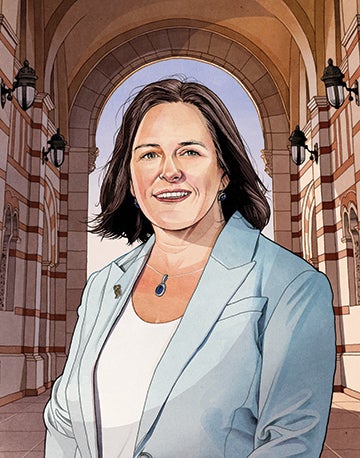The Doer
Provost Amy Dittmar reflects on her first year at Rice — and what’s on the horizon.

Fall 2023
Interview by Lynn Gosnell
Illustrations by Adam Cruft
On Aug. 1, 2022, one month after Reginald DesRoches became Rice’s eighth president, we welcomed Amy Dittmar as our new provost — Rice’s chief academic officer and executive vice president and a key partner on the president’s leadership team. A distinguished scholar of economics and finance, Dittmar brings deep experience in university administration to Rice. She served as senior vice provost of academic and budgetary affairs, acting provost, and executive vice president for academic affairs at the University of Michigan, a top-ranked public university with more than 50,000 students and an annual budget of $11 billion.
At Rice, Dittmar works with deans, vice provosts, department chairs, faculty and others to support excellence in all the university’s academic, research, scholarly and creative programs and activities. “I wanted to come to not only a great university but also a great community, where I could work to have an impact, on a campus where I see familiar faces as I go about my day. I’ve found that community here.” We spoke to Dittmar in greater depth about her can-do approach in her first year at Rice.
Learning curves and building relationships
I spent 19 years at my last institution — seven in the provost’s office. Over that time, I developed strong relationships with leadership, deans, faculty and staff. I am a get-things-done person, and because I had these relationships, I understood what the university needed and knew how to do things there. That’s my management style — to listen, understand and then act — so I set out to quickly begin to build those relationships at Rice. And right away, I realized this community was open and welcoming.
Hello, Brockman, Brown, Baker …
One of the funniest moments about getting to know the campus was when I was going to my welcome reception at Brockman Hall. I looked at the map, and I walked to Brockman — turns out there’s two Brockmans. Luckily a faculty member redirected me, with a strange look on his face that said, “You thought that your reception was here?”
Lunch and listen
In my first year, I had a goal to visit every department, most of them during faculty meetings, often over lunch. I came without an agenda — just to listen. I would usually ask everybody three very open-ended questions:
1. What should I know about your department that I wouldn’t know if I looked at your website?
2. What do you love about Rice, aka what shouldn’t I mess up during this period of change?
3. What are the barriers getting in your way?
And then it would just be a conversation — a way of hearing what was important from people and a way to get to know the culture of Rice. What we’re hearing from the people coming out of the strategic plan is not to mess up what makes Rice, Rice. We’ve heard that we need to preserve the feeling of being in a small community, because that’s who Rice is. [It’s] not a number of students — it’s more that small community feel. They feel known.
First steps: support for our graduate students
One of the first big decisions I made concerned supporting graduate students, doctoral students in particular. I have worked closely with graduate students, including overseeing their support. So, I could see we needed to establish standards, such as having a minimum stipend, so that all graduate students make at least a certain amount. That would be a raise for some students. That’s a first step in making sure that our graduate students are well supported on campus.

I would die without my many to-do lists. I use an app called Todoist. It’s on my phone and my laptop. If I’m sitting in a meeting and an issue comes up that I need to follow up on, I can just click and write it down.
A faculty-hiring initiative for the books
We have a goal to hire 200 faculty across all schools over the next five years — it’s one of our largest initiatives — and we’ll create many cross-disciplinary connections through this hiring initiative. We hired 46 new tenure-track faculty last year, and they are in the process of joining Rice. We have 22 new benefits-eligible nontenure-track faculty, plus 15 more faculty teaching one or two courses each. As this year’s faculty budget was set by the prior administration, we expect to grow even more in the upcoming academic year. We will have more than 65 tenure-track searches in the next year. We’ve also had strong faculty retention, successfully retaining faculty with offers from many top schools. Growth in faculty will help us increase our excellence in research and teaching while maintaining our small community feel.
Overhauling an outdated family-leave policy
We should be one of the best places to work, but Rice’s family-leave policies seemed out of sync with where we should be and where the country is. There was a “primary caregiver” leave policy for tenure-track faculty, guaranteeing a full semester of paid leave, but not for our nontenure-track faculty — nor for staff who are welcoming a new family member. Rice’s new policies allow staff to take up to six weeks of 100% paid leave after a child’s birth or adoption. And nontenure-track faculty can take between eight weeks and a full semester of 100% paid leave after a birth or adoption. As a working mom, I went through these challenges myself, so I really appreciate the significance of these changes.
Recognizing research
We established a handful of awards that highlight different aspects of research — both for younger researchers as well as those who are mentoring graduate students. This may sound small, but it is part of this bigger arc of recognizing research and making sure that we are doing it in a way that is inclusive across disciplines — much like we do with our spring teaching awards.
Who does Rice want to be?
We launched a strategic planning process in January. This fall, I’m reconvening the groups guiding the plan and reviewing all the data that’s been collected. At a high level, this data shapes an answer to questions such as, “Who is Rice?” and “Who does Rice want to be?” Some themes are coming into focus — providing all undergraduates with the support to be successful, recruiting and retaining the highest-quality graduate students, strengthening basic and translational research, and ensuring a positive work environment for faculty and staff. In addition to those core focus areas, we have identified ways Rice is uniquely positioned to leverage our expertise to contribute solutions to some of the world’s greatest challenges, including a sustainable environment, innovations in health, and thriving urban societies.
Transforming the budget process
We’ve launched the process of transforming Rice’s budget processes by building a partnership with Kelly Fox, the executive vice president of Finance and Administration. It truly is a shared partnership. As part of an ongoing budget transformation initiative, the academic budget is now under the provost’s purview. It’s a big change for Rice, and one that allows us to better support the academic mission of the university, particularly around faculty hiring, supporting research and providing resources for students.
I think like an economist. A budget not only reflects your values and your goals and your strategy, it impacts them as well. It’s not just because it funds certain things. It actually can change the way you make decisions and influence behavior. That behavior will also impact the funding you have available. As you develop a budget model within the university, we’re thinking about both what needs funding but also the collective good of the university. For instance, many of the most pressing problems, such as sustainability or innovations in health care, require a multidisciplinary approach, so we need a budget model that incentivizes research and teaching that reaches across academic schools.
Data and decision making
Something that is important to me is having a data-driven decision-making culture. I have always appreciated data, and understanding how to interpret complex data is a core part of my research; data may not tell the whole story, but it gives you insight and, when shared, creates a culture of transparency and shared mission.
The key to time management
I would die without my many to-do lists. I use an app called Todoist. It’s on my phone and my laptop. If I’m sitting in a meeting and an issue comes up that I need to follow up on, I can just click and write it down. It’s based on different categories, which allows me to track the interrelated nature of projects. I tend to move pretty quickly, so part of my time management is my ability to pivot between topics and just keep going.
A lifelong love of literature
Growing up, I really liked [studying] poetry and literature — I started college as an English major and ended up with an English minor. But I discovered in college that I also loved math and I was very good at it. So, I started gravitating more toward the quantitative side of a career. These days, I do love audiobooks — especially listening to authors read their own works.
I [heart] Houston
I just find Houston to be an incredibly livable and enjoyable city. The fact that I can live 10 minutes from work and have a house that’s big enough for the kids to visit for holidays and breaks — Abby is earning her Ph.D. in ecology and evolutionary biology at Florida State, and Graham is studying at the Culinary Institute of America — is amazing. And then there’s great art, great restaurants and great parks. Graham says the food scene [in Houston] is better than in New York City.
And we also have a yard that’s big enough for Smokey and Bandit, the Newfoundlands. They look like bears, so people would always say that our first Newf looked like Smokey the Bear. My husband, Bob, never liked the name. When we got the second dog, Bob said he would embrace the name Smokey if the pair were named Smokey and (the) Bandit. If you’re of a certain age, you get the reference.
